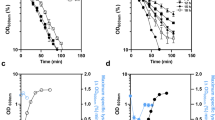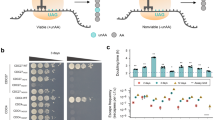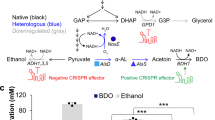Abstract
IN a continuation of our work on the mode of action of the enzyme preparation obtained from, the cell-free supernatant of Streptomyces GM, so called ‘strepzyme’1,2, we have found that, with our culture conditions, the cell-walls of Candida utilis are highly susceptible to enzyme action. The aim of the experiments recorded here was to ascertain whether the process of cell-wall digestion with this lytic enzyme preparation runs parallel to that observed when using the digestive juice of the snail Helix pomatia.
This is a preview of subscription content, access via your institution
Access options
Subscribe to this journal
Receive 51 print issues and online access
$199.00 per year
only $3.90 per issue
Buy this article
- Purchase on SpringerLink
- Instant access to full article PDF
Prices may be subject to local taxes which are calculated during checkout
Similar content being viewed by others
References
Garcia Mendoza, C., and Villanueva, J. R., Microbiol. Espan., 15, 139 (1962).
Garcia Mendoza, C., and Villanueva, J. R., Nature, 195, 1326 (1962).
Eddy, A. A., and Williamson, D. H., Nature, B, 179, 1252 (1957).
Svihla, G., Schlenk, F., and Dainko, J. L., J. Bact., 82, 808 (1961).
Author information
Authors and Affiliations
Rights and permissions
About this article
Cite this article
MENDOZA, C., VILLANUEVA, J. Stages in the Formation of Yeast Protoplasts with Strepzyme. Nature 202, 1241–1242 (1964). https://doi.org/10.1038/2021241a0
Issue date:
DOI: https://doi.org/10.1038/2021241a0
This article is cited by
-
Preparation of mycelial and yeast-like spheroplasts fromMucor rouxii by a lytic enzyme preparation fromPenicillium islandicum
Current Microbiology (1983)
-
Kybernetische Untersuchungen zur Strahlenwirkung auf Hefezellen
Biophysik (1967)
-
Electron microscopy of thin sections of Candida utilis: The structure of the cell wall
Archiv f�r Mikrobiologie (1965)



